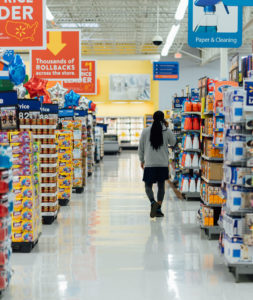District Court of Appeal Looks at Duty to Warn in Florida Grocery Store Slip-and-Fall Case

Florida case law has long held that the proprietor of a business must use reasonable care in maintaining the property. The owner or manager must learn the actual condition of the premises and then either make the area safe or warn of any dangerous conditions. If a condition is obvious, or one that can be readily perceived through the ordinary use of the senses, the proprietor is relieved of the duty to warn. A First District Court of Appeal decision (Case No. 1D16-1285) looks at what constitutes an obvious condition and when a proprietor is relieved from liability under premises liability law.
In the case, the injured patron of a grocery store went to make a purchase and obtain empty boxes. He made four trips in and out of the store. During these trips, another company was delivering a shipment of beer. The beer was stacked about five feet high on a pallet between the entrance and exit doors, with an empty pallet sitting on the delivery cart’s prongs to the right of the exit. The injured patron saw the empty pallet but tripped and fell, suffering injuries. The injured patron filed suit against the grocery store, alleging the store failed to warn of the dangerous condition and failed to keep the sidewalk safe.
During the early part of litigation, the injured patron provided an affidavit from an expert, alleging the store created an unsafe condition. The store provided still-shots from video surveillance. The injured patron had previously testified during a deposition that he did not notice the empty pallet on the first two trips, but he did notice it on the third. The injured patron testified that he tripped on the prong underneath the pallet, rather than on the pallet itself. After reviewing the evidence provided by both sides, the trial court granted the store’s motion for summary judgment, determining the pallets to be an open, obvious, and ordinary condition. The court found that the condition was not inherently dangerous, relieving the store of any duty to warn and liability for injuries.
In its review, the Court of Appeal analyzed earlier Florida premises liability decisions. One prior decision noted the two duties imposed on business owners are “separate and distinct.” An obvious object is not the same as an obvious and inherent danger, and the duty to warn revolves around the latter. The proprietor must also have “superior” knowledge of the dangerous condition. If the store has the same information as the injured person regarding the condition, the store has no duty to warn. Even if the duty to warn was necessary and satisfied, the owner or manager must still use reasonable care to keep the premises safe. If the patron is able to protect himself or herself from the condition, the proprietor has fulfilled its duty to keep the premises safe.
In the case, the appellate court determined that the store upheld both duties. The injured patron admitted he saw the empty pallet when exiting the store, but he took four more steps before tripping on it. The court felt the surveillance footage eliminated the possibility that the injured patron tripped over the prongs and showed that the patron actually avoided the pallets on his other trips. The court also found that the store had equal knowledge of the condition as the patron. Since the condition was open and obvious, and the patron was able to avoid the pallets and protect himself, the court determined that the store was not liable for the patron’s injuries. The summary judgment was upheld.
The Florida premises liability attorneys at Weston & Pape have the personal injury experience you need to help you with your slip-and-fall case. Call today for a free, confidential consultation at 772-266-5555 and 561-299-3999.
More Blog Posts:
Florida District Appellate Court Reviews Future Medical Expenses in Multi-Car Accident Case, Florida Injury Lawyer Blog, November 28, 2016
Federal Circuit Court of Appeal Declines to Find Equitable Tolling in Slip and Fall Case, Florida Injury Lawyer Blog, October 21, 2016

 Call Us Today
- It's Free
Call Us Today
- It's Free